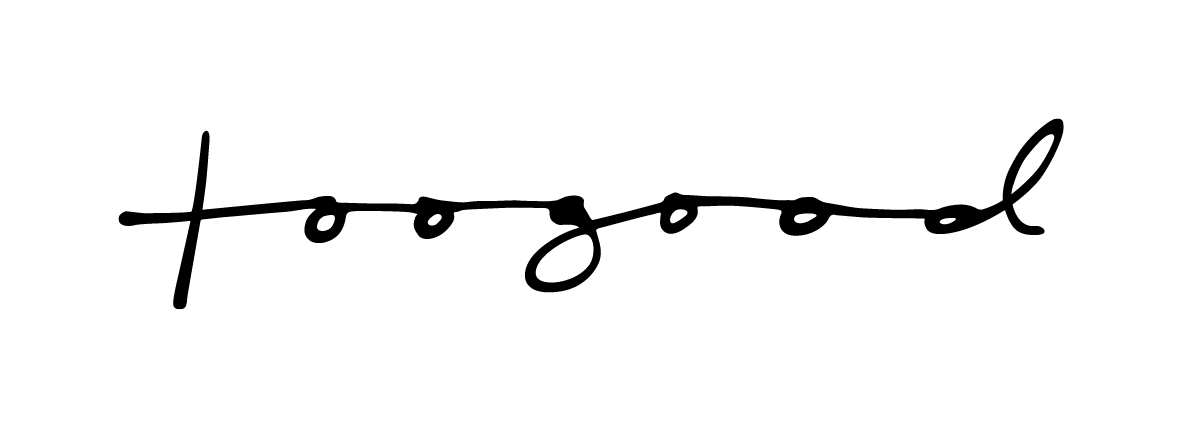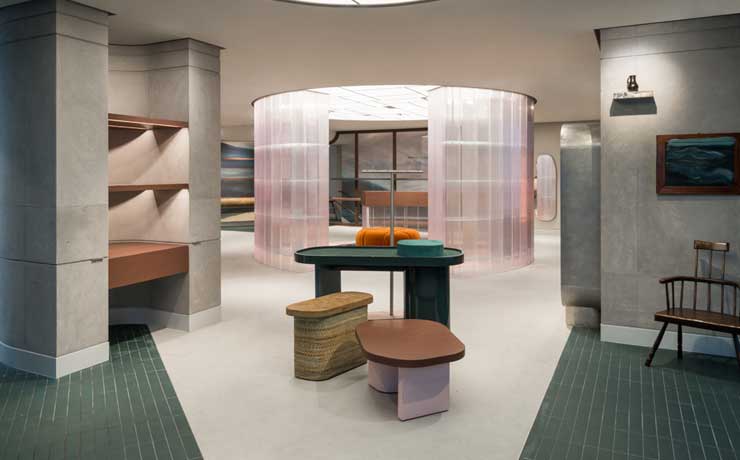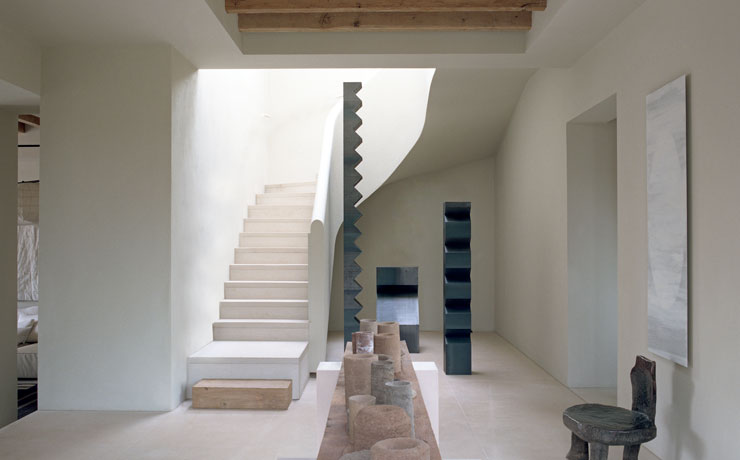January 2024
Photography: Matthew Donaldson and Spring Restaurant Words: Bonnie Langedijk
HUR CONVERSATIONS: FAYE TOOGOOD & SKYE GYNGELL
BREAKING BREAD AND BREAKING BOUNDARIES
Those who disrupt industries are rarely afraid to break the rules. And exactly that attitude, is what makes them think outside the constraints of the establishment and move the needle. Two women who’ve done exactly that are Skye Gyngell – the renowned chef behind London-based restaurant Spring – and British artist Faye Toogood.
During their first meeting, at the launch of the first Ffern perfume, the two hit it off. “I sat next to you and the thing that I connected with you the most about is that you’re very vulnerable. You’re beautifully open about yourself,” Gyngell shared. “I feel like I could've known you for a hundred years and yet we don't know each other that well. Do we?” she continued. Toogood agreed, “We spent a few times together, but I agree. I feel like I know you very well and I trust you.”
While the two work across different industries, there’s a myriad of experiences they share. From building businesses of their own to the importance of nature in their work to both seeing themselves as outsiders in their respective industries. By carving their own paths, both women created worlds without compromising on their vision. And with it, building a new blueprint for what the future of creative businesses could look like. But we’ll let Faye and Skye do the talking.
Skye: I don't know if polymath is the right word, but Faye you are so multidisciplinary in what you do. I'm more of a one trick pony in a way.
Faye: No, that's not a one trick pony. I respect this focused singular attention to detail. I'm more ADHD about the whole thing. One minute I'm really focused on this, and then the next minute I'm very focused on something completely different. To see how all your energy is channeled into one aspect of what you do, I would love to be like that. I describe myself as a tinker, a sort of master of nothing.
Skye: I've always felt that you have to put everything into one thing. There are probably very few people who could turn their hand to anything. One day you’re doing uniforms for Sessions Arts Club, then you’re going to Nike to talk to them about something else. Whatever the energy is that you put into everything, it must be a very extraordinary fire.
Faye: I think that’s one of the things we share. Where you may be focused on one thing, there's still always one foot in front of another. You might open your restaurant, but then you're very focused on what the interior's going to look like, how you're going to communicate your menu. There's always another challenge. My challenges are just not necessarily under the same umbrella.
Skye: But there’s something that centers everything.
''There's always another CHALLENGE. My challenges are just not necessarily under the same umbrella."
Faye: It was the process of doing a book that helped me work out what the pillars are. It’s sculpture, landscape and materials. What are the things that drive you?
Skye: The incredible beauty of nature through food and growing. It's about the visceral response I have to seeing beauty. The thing that gives me the most joy is plating. I love deliciousness. I definitely love to feed people. Maybe it's a bit of me that felt, if I'm really honest, a little bit unloved, unnurtured as a child. I would say I express my vulnerability through food and cooking and plating.
Faye: This connection to nature, I think it's important to both of us because it's something very reassuring. It's the anchor. When you're talking about plating food, you’re building worlds and landscapes and it’s about feeding and it’s about connecting to people. I've always described design as a present. I'm in it for the: Did you love it? Is it comfortable? Do you love wearing it? Has it changed your life? I can see that you do that with food and I do that with objects or clothes or furniture.
Skye: But that thing, when you said, do you like it? Is it comfortable? Have I made you happy? Is that very female? That desire of wanting to give pleasure?
Faye: It may well be very female. It's about connection, isn't it?
Skye: I think very little of anything I do has anything to do with financial gain.
Faye: No, that's not the driver at all. It's a by-product.
Skye: Exactly. It's allowed you to continue to do your work. At some point, it's important that I place value on myself in the work that I've done because I would happily give everything. I've been working in food for 40 years and I've had my own restaurants for the last 25 years. Every time I see someone walk in the door, I think: What? You are actually coming to Spring. I really get a shock that people would actually turn up. That gives me this huge thing that it's my job that you've been so incredibly gracious to come and eat at our restaurant, that we must give you the best experience. Near enough isn't good enough. It's such an honor to be seen. I know that sounds so deep and weird, but it's about self-esteem, isn't it?
Faye: It's definitely connected to self-esteem. Do you think that’s a female thing? That’s definitely something that I suffer from. It's interesting, isn't it? Both being from the same generation of women setting up their own businesses.
Skye: Not the same generation by the way, Bonnie
Faye: More or less. We still don't value ourselves. We still put ourselves last. It takes a huge amount of effort for me to value myself.
Skye: We've talked about it. I know you do weightlifting and I do pilates, but I have to lock that in as a non-negotiable in my life. There's certain self-care things I need to do in order to kind of continue, I think.
Faye: Is that because you also have a self-destruct button?
Skye: Yes, totally.
Faye: My self-destruct button is pretty big too. In terms of the restaurant scene that you’re in, how would you describe how you fit into the landscape as a chef and restaurateur? Growing up I always understood it as being quite a male dominated environment. Restaurants always looked a certain way. Certainly fine dining had a definite style to it. Entering Spring, it's so different aesthetically and feeling-wise to other fine dining experiences that I've had.
Skye: I don't really know. I fell into cooking by accident. I started a law degree actually, and I got a job working in a kitchen.
Faye: So you didn't study this, and I didn't study design.
Skye: My family was macrobiotic. It was this very serious attitude around food, but it was about food as health, not as delicious. I went to work washing up in a kitchen and the woman who ran it was this beautiful Lebanese woman who had a heart the size of a watermelon. I think she saw this quite fragile teenager – I was 17 or 18 at the time – washing up in the corner. She used to say to me when there was a quiet moment: “Do you want to come over and make mayonnaise with me, or do you wanna come over? I'm just making some puff pastry.” And every time I did it, she would say: “Oh my goodness, you've done such a good job.” I really loved it and I loved standing next to her. It was the first time I felt connected to something tangible. Anyway, long story short, I went and I trained in Paris. When I went to work in mainstream restaurants – I was in Paris for a few years, and then I moved to London – and I thought, I fucking hate all of this. This is not my time with Layla, when my heart was feeling full. This is a kind of stainless steel, strip lighting, horrible, revolting men. And I decided, when I found Petersham [Nurseries] particularly, I'm going to make the world that suits me. I don't see myself as a chef, I see myself as a cook. I'm not sure I do something that's connected to any other people in my industry.
Faye: I've always described myself as an outsider. An outsider of the fashion world, an outsider of the art world and an outsider of the design world. But actually I partake in all three in a way. What is your next challenge? Do you have that worked out?
Skye: I've definitely seen my life in thirds. If you ask me about where I am in my life, I'm probably in my last third. I'm absolutely surprised by the benefits of growing older. Without sounding too contrite, I want to be of service. We’re trying to create this growing program and get young people back to the land. I'm thinking about how I can do something that's not about me. It's not my time for it to be about me. What I wanted from work and what's important to me at work now is not the same. I still get incredible joy from creating dishes and plates, but it's also about how I can create an environment that's really happy and safe for people.
Faye: That's so beautiful. I feel myself coming to the end of my second third. I was describing it to this friend the other day. I said, you get to this point, and I think actresses certainly get this, where you are not emerging, but you are not established yet. You're in this weird in between bit where there's still a leg in this emerging pool trying to keep up, be the latest thing.
Skye: Exactly.
Faye: But you haven't made it to the establishment yet because there's still a bit more that needs to settle in terms of your work. I've just started doing a very small amount of teaching and I'm amazed at how much I got from that. There's more to be done culturally beyond what we're actually making.
Skye: I find it interesting to think about how you can work inter-generationally with humility. Young people have so much to teach us, and there's this world out there that's just beyond me. When you've lived long enough, you've lived through experiences and that’s what you have to offer. The Irish always say 'shroud has no pockets'. We're not taking anything with us when we die, so what can we leave? That's what could be my legacy. It's not going to be my spaghetti bolognese. It's how I’ve nurtured young talent or being kind to people. That's what interests me. And I just pray that I get to be busy until the day I die.
Faye: Oh God, yes. To have a bit of a purpose and get up every day and be busy.


